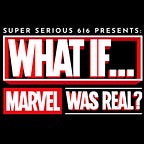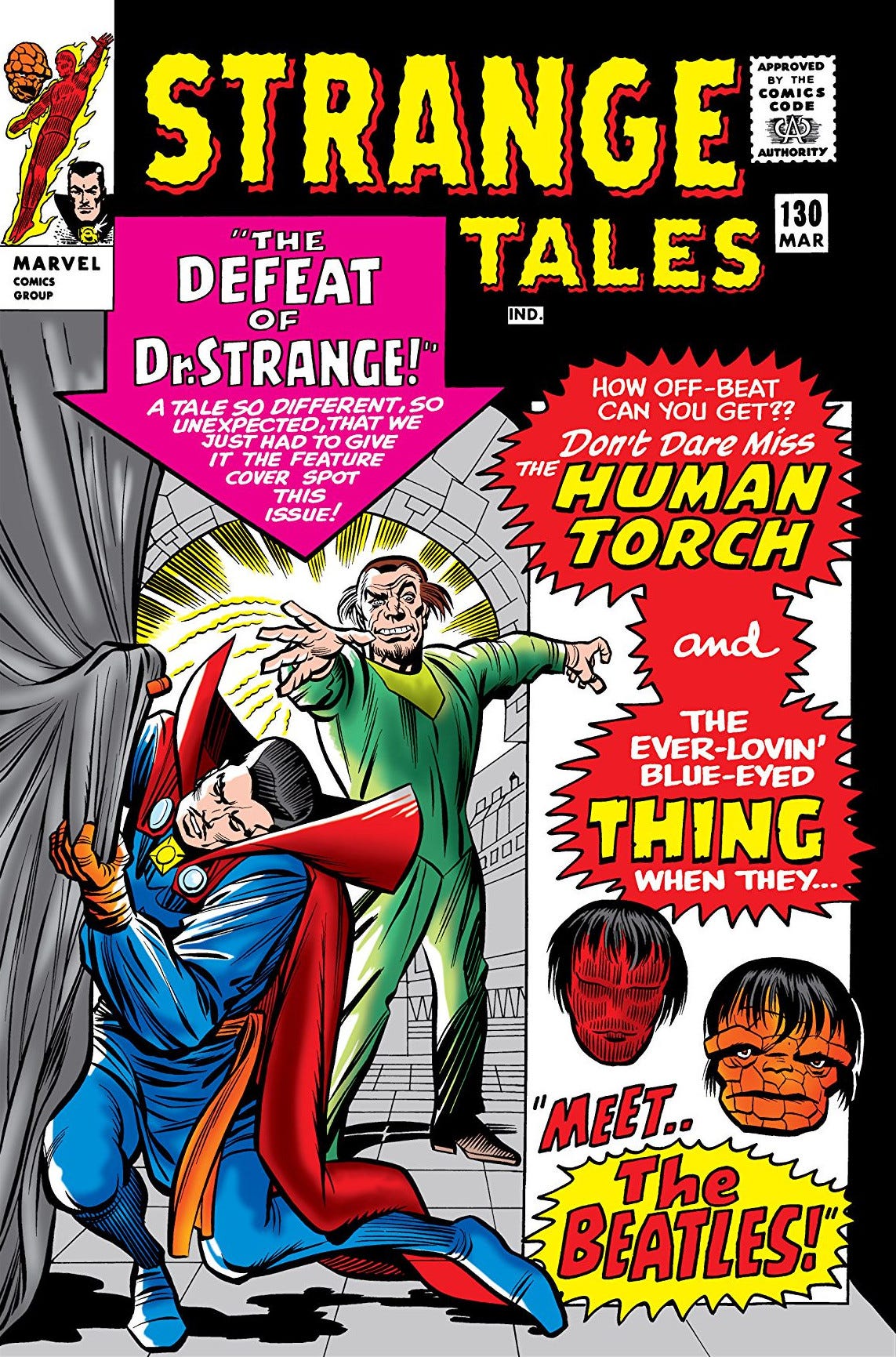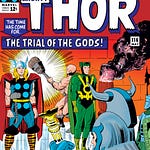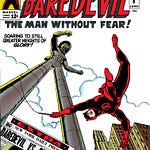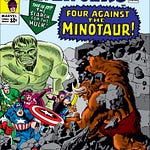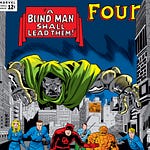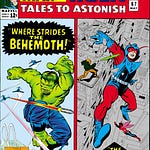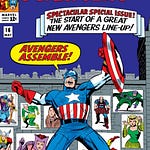In this episode:
Mike and Ed discuss whether the Fantastic Four or the Beatles are more famous. The Thing and the Human Torch were recently at a Beatles show and did some damage while capturing thieves who targeted the cashboxes. Who should pay for that damage? Should good samaritans like the Fantastic Four be held responsible? If they are, what type of disincentive does that create for other superheroes to help others? Are there more superpowered people out there who are keeping their abilities secret because they can’t afford the insurance?
Behind the issue:
The Beatles are first mentioned in the Marvel Universe in Fantastic Four #34 (two months prior to this issue’s release), but this is the first appearance of the actual band. The Beatles' first comic book appearance was a few months earlier in July 1964 when Dell Giant released a special issue focused on the fabulous foursome. A few days after the Dell book hit the stands, an Archie title also mentioned the Beatles (Archie's Girls Betty and Veronica #105) and the girls shopped for wigs, but the actual musicians did not appear. Perhaps the very first appearance was in the aforementioned Archie series #104, which teased the following issue and had a page of text explaining who the Beatles were (see below). The Beatles are mentioned in Marvel Comics a number of times through the years, but, as far as we are aware, they do not appear again until 2007, when it is revealed that the band had been kidnapped years ago and had been replaced by Skrulls (who were responsible for the majority of their music in the Marvel Universe).
In this issue:
The Thing and the Human Torch are getting under each others’ skin, and likely need a break from each other. No such luck, as their girlfriends convince them to go see the breakout sensation from Britain, the Beatles. The foursome head to the show, but before it begins, they learn that the venue’s payroll has been stolen. The Thing and the Torch head out and capture the criminals, but unfortunately miss the entire show.
Assumed before the next episode:
People are more interested in being entertained by the Beatles than being saved by the Fantastic Four, or so we assume
This episode takes place:
After the Beatles have started their British Invasion!
Full transcript:
Edward: Mike, who is more popular? The Beatles or the Fantastic Four ?
Michael: I think if you listen to our show regularly, you would assume the Fantastic Four. But if you lived in the real world you'd probably say The Beatles people meaning it for a reason, right?
Edward: Fantastic Four have clubs, fan clubs, but there's no fantastic mania. How even the four mania how would you even say that?
Michael: Yeah, I don't know ff mania, but like, you know, there's, I think
Edward: we don't swear on the show, Mike. No swearing on the show.
Michael: Yeah, . Well, they're certainly popular. They're incredibly popular and they're being followed and there's celebrity magazines that report on them, but, Nothing like the Beatles. Nothing like The Beatles has happened in a superhero superpowered world. Yeah.
Edward: And in this particular case, we had the Fantastic Four went to go and see a Beatles show and we've had no incidences, we know about where the Beatles have gone to see a Fantastic four show.
Michael: No, they're not showing up the Baxter Building, you know, pen and paper hand asking for autographs. Although, funny about it is maybe it's just a comment on human nature or our society, but like the Fantastic Floor have saved the world more than once.
Edward: And Beatles, the Beatles have not, Beatles have never saved the world.
Michael: So you think, you'd think that if there's gonna be this adulation, idolatry, of anyone, it would be the fantastic for, but no, it definitely isn't. It definitely is not. The Beatles are far more popular.
Edward: Yeah. The, I guess the Beatles have saved music.
Michael: Okay, we'll go with that. They definitely struck a nerve in our society and they're making their mark. And so time will tell us whether the Beatles will be remembered. But right now it's hard to avoid them. If you're trying to avoid them, they're everywhere.
Edward: There's that question too, a thousand years from. Looking far, very, very far in the future, are we gonna remember the Fantastic four of the Beatles and I think it would be the Fantastic four, the first real superheroes on the planet are I imagine more memorable than any music band
Michael: the Fantastic four are, as we chronicled or the vanguard of this new evolution of almost post humanity then this is a moment in our history, where there's, who knows where we're going to evolve to. So my money would be that the Beatles are a flash in the pan and the Fantastic four are here to stay
Edward: and interesting there's four of each of them. I think that's a coincidence?
Michael: Oh my, I didn't think about that. So do you think that maybe, do you think that there's a matching principle going on here, we noted in, remember we talked about recently with the frightful four, there's four of them and we're just confused as to why they would limit them.
Why wouldn't they be like the hateful eight or something. But instead it's like they pick the four and the beetles are quarted as well. So do you think. Are we? Are the Beatles being influenced by the Fantastic Four? Is music being influenced by superhero culture?
Edward: Yeah, maybe. Or maybe the other way around. Maybe the Fantastic Four just search out for groups of four things.
Michael: Yeah.
Edward: They go to the grocery store and be like, yeah, I know you have a dozen eggs, but do you have like a smaller package, like maybe a third the size?
Michael: Or maybe. Or maybe it's just. Things come into four, right? There's the four of food groups, there's four seasons. It kinda just naturally would evolve to where the Fantastic four, who, when you really think about their powers are quite elemental in nature. They have this sort of,
Edward: there's four elements. There you go.
Michael: There's four elements. Yeah. So maybe there's an inherent connection to the idea of having teams of four. Although maybe I'm just spinning some mirror here. But anyways,
Edward: Can you match them? Can you look at the, we talked about this before, the frightful four. There's like a match almost between, Medusa had her stretchy hair. Mr. Fantastic Reed, Richards could stretch his body. There was kind of a rough match between
Michael: mm-hmm.
Edward: the Frightful Four and the Fantastic Four. Can we do the same thing with the Beatles, is there does Paul match to Sue? Like what is the match? The Four Beatles and the four Fantastic. Four.
Michael: You know, I just don't know enough about 'em but maybe there might be something there. Maybe that's something that if they stick around, we can we'll explore it a little more and look, maybe they're the first. Maybe the Beatles were the first super. Powered band. Maybe we're gonna find out that they have powers too. Just don't know about, we just know, know
Edward: IF it happens to anybody, it'll happen to the Beatles. I think a couple things to talk about. I think with this encounter with the Beatles and the Fantastic Four, well, I guess the Fantastic Half, the Fantastic four, it was The Thing in the Human. Torch were going to see a show and in the process, I guess someone tried to steal all the money from the show and
Michael: mm-hmm.
Edward: the Fantastic Four prevented that. So I guess they did, they did their good deed for the day. But in the process of doing that good deed, they did some damage and. I think this is interesting is that the damage that they caused is not being paid for by the theater, not being paid for by the Beatles, not being paid for by the government, not even being paid for by an insurance company. The fantastic for themselves are gonna cover that damage. And I think that's just, it's interesting that it wasn't like The Thing and the Human Torch were being professionally employed by anybody. They went out of their way to help the Beatles or to help the theater anyway with these thieves, and now because of that good deed, they're gonna have to pay. They're taking the money outta their own pocket, and that doesn't seem,
Michael: It doesn't, and it, but it's interesting. It probably, it gives us some insight into the institutional nature of the, or at least the institutional connection between the Fantastic Four the society that they live in.
So we've talked before about how the Avengers seem to have a pretty direct connection, almost be a separate like military force or arm of the armed forces in America. But the Fantastic Four haven't. You think that Fantastic Four has some kind of formal relationship. As being almost a police force that they would. They'd have an immunity from any kind of possible civil liability or prosecution if they're,
Edward: are you saying that they are a police force or they should be a police force?
Michael: I'm saying that they aren't, because if they were then if they're acting in the course of their duties, then they would have an immunity from prosecution and civil liability to provide that they were still carry of their duties within their own responsibility. And so then they wouldn't care about paying the damage themselves because if they got sued, they have an insurance policy, they would respond. And they're not, they won't be worried about, say, being arrested for the damage that they caused in the course of exercising their duties.
Edward: And that's, I was gonna say that's probably true. If when the US military went and asked the Fantastic four to go and take down the Hulk, they were basically working under the under the authority of the US military, and I'm assuming that any damage caused during that battle with the huk was paid for by the US government, by the military. In this case nobody asked Ben and Johney to go and stop the thieves. They just, they were good Samaritans and they went and did it. That changes the calculation a little bit.
Michael: It does up that. I think when they're tasked by the American military, I think that they could be considered to be contractors in that role. But I am saying that here, that they just acted as good Samaritans and did a public good. They acted as if they were, police officers. But the fact that they paid outta pocket tells me that they don't have any kind of special protection or immunity from prosecution or from civil liability. So they did, then they wouldn't have reached into their own pocket. But the fact they reach into their own pocket tells me that they're doing the analysis, which is that it's probably better for us just to pay outta pocket than to get sued by the people that owned the buildings that were damaged or anyone that had a possible liability claim.
It's probably just worth their time to pay it out. So they must have number one tons of money. And number two they don't have any kind of protection. So number three, they're gonna use their money to avoid getting sued and have their time being eaten up. It's just worth their time to just pay people rather than having a claim against them.
Edward: But I guess why are they doing it at all? So basically these thieves came in, they stole the money, they took off if Ben and Johney just said, oh, you know what, that's not our problem. We're gonna go sit and watch the show.
Michael: Mm-hmm. ,
Edward: Then number one, they get to see the show, and number two is they're only out of the ticket price. Instead, they went and chased these guys down. They didn't get to see the show, and they had not having to pay a bunch of money outta their pocket. What was the incentive for them to do that?
Michael: That's The Thing, right? If there was a, they had immunity from a civil lawsuit, then they would go do it. But here they clearly don't. And so they had to pay out of pocket because they're involved in this incident that caused damage and they pay out pocket cuz it's easier for them to make the claim go away, the potential gifts go away. And I don't know what their incentive is other than to do that other than that they're heroic or because they feel they can solve the problem and they have so much money that it's worth it for them to both be heroic and to also make sure that they don't have their time wasted that they're, after you keep against them,
Edward: you keep saying they have so much money. Is that true?
Michael: They'd have to, otherwise they wouldn't do it. If they didn't why would they pay out of pocket? Why would they wait and get sued? I guess.
Edward: I guess that's my question. So where's that money coming from? I guess they had that one movie that they had a while back. And Reed has some inventions that he's invented. He lost all his inventions that he invented in the past due to that bankruptcy. But he presumably he's invented other things since then but it doesn't seem that that's an unlimited fund of money. I just, I think there's a, from my business world. One of the heroes of the business world was Adam Smith, who invented the whole idea the trade is good. And one of his famous quotes was, it's not the benevolence of the butcher, the baker, or the brewer that we expect our dinner, but it's regards to their self interest. We don't count on the butchers and the bakers to give us their foods for free. Why are we counting on superheroes to do all of their work for free?
Michael: We're missing some information then, right? Because it's clearly happening. So number one, the Fantastic Four don't have this protection from being suit for damage that they cause in the course of acting heroically because they're paying out pocket, because that's the only reason that you would pay outta pocket. So why would they continue? Why would they do it?
Edward: So let me dive into that cause it's exactly right. It sounds like of there's an incentive to be a butcher, there's an incentive to be a baker.
Michael: Mm-hmm.
Edward: society incentivizes people to be police officers and salesmen and retail clerks and radio personalities like us, there's all sorts of incentives in the system for these things. It sounds like right now there's a disincentive to be a superhero, and so that's what, okay, go ahead.
Michael: I was gonna say that, but that's where I think this is going is that. On its face it doesn't make any sense unless they have so much money and how are they getting so much money? I don't know. Perhaps it's that we are talking about the Fantastic four who have access to space travel and interdimensional travel, right? Based on their recent adventures to our knowledge.
Edward: They're just stealing from other dimensions and bringing,
Michael: I don't, yeah, I don't know. I do not know if they have access to resources or minerals or something that we don't have access to here and that we're just not made aware of it. Or Reed has been inventing things and selling and profiting off of that.
Edward: Yeah. So I guess that could be it, right? So you could be Right. Maybe they're just obscenely wealthy and in order to keep that wealth, in order to keep getting access to these other dimensions and keep the government off their back, they go and do good deeds for good public relations and those good deeds cost them money. But in the same way that, I dunno, Proctor and Gamble donates to clean water in Kenya, they're just like going like they're, it's like the tax on them. The good deed tax is there to keep their good PR so that they can go and make their money some other way that we don't really know.
Michael: Yeah but on a personal level I work as a lawyer, so I make my money by going to work and billing and I bill my time. And so if I'm walking to work and I see someone's gonna walk into traffic and I'm gonna stop them because that's a normal human thing to do and it, but on a cost benefit, I guess it costs me time so therefore it costs me money. Cause I don't get to go to work early enough. But, It's on a human level it's what you wanna do. Now if it's now if to save, if I saw someone fall into traffic and for me to save them would require me to, you know, run.
Edward: You don't want to skuff your shoes.
Michael: No, but if I could lose my life, then I think that it might be more, I'd hope I'd be heroic and chance losing my life to save somebody who's falling into traffic but I don't know, maybe that's where there would be a line. And what I'm saying is that the fantastic core haven't hit that line yet. Yeah, it's still worth their time.
Edward: Let's going back to this scenario, it's even worse than that. It's imagine if now you go and you save that guy, he falls down the road and you rush into the road and you save him but in so doing so, you cause a car to swerve and hit another car. And so now they wanna fine you for that car accident because you jumped in the way to save that dude. That doesn't seem right either. It's one thing you've already risked your life, you've already taken your time. Now we're gonna say, Hey, oh, and by the way, now we want your money too.
Michael: That analysis only works, that analogy only works, is that I said, whoa, whoa, whoa, whoa, whoa. Okay, hold on a second. Let me pay for everything outta my own pocket. But I have an insurance policy that would respond to it. So likely I'm gonna be okay. So even if I did that quick math in my head, is it worth it for me to go in traffic?
Edward: Yeah. But should your insurance company be paying for that? The guy who busted his car up again, not, not his fault, maybe the guy who felt that in traffic, you go after him, but going after the insurance company of the guy who saved the person's life, that doesn't seem right,
Michael: It doesn't work like that though. If somebody falls into traffic and I go in and try to save them, as a result, some other car gets into an accident. I guess if they sustained injury, they would sue me. They wouldn't Sue the insurance company. My insurance company would respond on behalf of me. And there are some legitimate legal defenses that would apply to that very scenario where it's there. I didn't do anything wrong. I wasn't negligent. They'd have to establish negligence in order to trigger it. But my point was less about the intricacies of motor vehicle law and claims, and more just to say that my analysis is not gonna be influenced. I wouldn't have to think I take into my pocket and pay this person out rather than pay my deductible so that when I got sued, that my insurance company would respond and defend me. Whereas the Fantastic Four, clearly it's just not worth it for them to. To possibly don't have insurance, which I don't think they do to respond to the claims that would be made them damaging that
Edward: if they did their insurance would be so high ,
Michael: they'd be so high.
Edward: What insurance?
Michael: You're an orange, rocky, monster that could destroy a building. So I think the insurance would be quite high if you had it. But at the same time, they could sued personally. The, Thing would have to, he is paying outta pocket. They must have so much money that it's just like there's, they're not even thinking about being tied up in a potential lawsuit later because so much dough
Edward: and so clearly all these disincentives that we're creating haven't stopped the Fantastic Four from existing. But what's I always find interesting is when these disincentives exist, we have to ask what isn't happening because of these disincentives. Are there lots and lots of other superheroes out there that are being like, you know what, I don't wanna be a superhero. Look how much it's gonna cost. It's too expensive to be a superhero, like being a lawyer. I'll just be a lawyer by day and a nothing by night because it's too expensive.
Michael: Well, I'm not, nothing by night a cause you know that.
No that's why Spider-Man wears a mask. We've been quite critical on Spider-Man, how he wears a mask and doesn't reveal his identity would be super critical of him.
Edward: And it's not, it's not afraid of a villain's attacking him. It's not because he's wants to do criminal things. It's because he's not super rich. Everyone who's not super rich wants to be a superhero, has to cover their face.
Michael: So maybe, so I think the solution would be if we recognize it being a superhero is public good, much like having volunteer firefighters and police officers and things like that, then there needs to be new legislation passed in order to provide some immunity from civil prosecution civil claims, if he did, it would remove that disincentive if The Thing and the Torch burned down a building or destroy a building, the building owner can't sue them because they were legitimately acting the course of their superhero duties and roles, then I guess I had to put a claim over to their insurance company. But what would, and I think the only way that works is that probably all of our insurance rates are gonna rise to accommodate that but it's pretty fair to spread their risk out of superhero related damage
Edward: It does. And then what that should open up is all these other superheroes that are presumably hiding right now and aren't doing anything. Or have they have secret identities or they have no identities at all because they're not super, they're just, well, they're super, but not heroes. If you wanna take, if you want more of your supers to be heroes, fix the insurance laws.
Michael: No fix. You know what we need to have, there? Have to be local, state level and federal legislation that's passed in order to have, immunity from prosecution and immunity from civil claims pass. And that the question for us, I guess as a society, is that a better way to go? Or is it better to have them running around with masks and I don't know. I used to be pretty anti masked, but now I'm kind of seeing the value of it.
Edward: Yeah. I think these laws, when you create these new laws, don't they have like catchy names and stuff too?
Can we call this law the put the hero back in supers?
Michael: I like where you're going with this, but what it be like, there's no i n team, but there's I Insurance Act from 1965.

